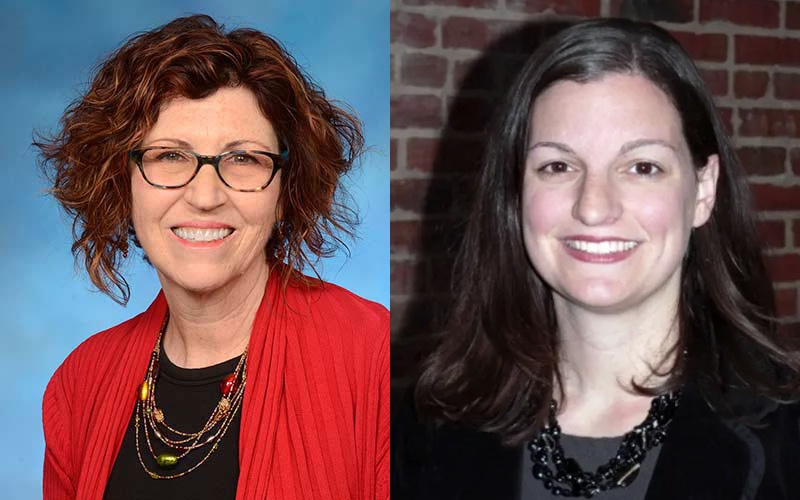UMSSW, UMSOM Collaborate on Toolkit to Help Employers Support Workers with Opioid Use Disorder
July 05, 2023 Christianna McCausland
Researchers found that many employers want to be more supportive but don’t know how. Find out more about the research in the spring issue of “CATALYST” magazine.
Photo: Marianne Cloeren, left, and Jodi Jacobson Frey.
The Jane Addams Resource Corporation (JARC) works to end the cycle of poverty by providing free, accelerated job training in manufacturing and connecting its graduates with meaningful work making a livable wage. JARC has found capable and willing trainees in Baltimore’s most distressed neighborhoods, but in its eight years here, Elaine Carroll, MSW ’12, vice president of strategic initiatives, says she’s lost countless graduates and trainees to overdose and other substance use disorder-related deaths.
“My mother died from her addiction. I’ve been in recovery myself. I have friends who’ve relapsed,” Carroll says. “I’ve seen it and I know what a beast addiction is.”
The University of Maryland Schools of Social Work (UMSSW) and Medicine (UMSOM) aim to generate resources to address barriers to employment faced by adults in recovery from opioid use disorders through the Workplace PROSPER (Partnering to Reduce Opioid Stigma and Promote Employment in Recovery) program. Led by Marianne Cloeren, MD, MPH, associate professor, UMSOM, and Jodi Jacobson Frey, PhD, LCSW-C, CEAP, professor, UMSSW, one stage of the project’s work involved analysis of data such as risk for opioid-related use by industry and incidence of inappropriate opioid prescribing practices. The other was to bring together stakeholders, like Carroll at JARC, to better understand the needs of employers.
According to the Substance Abuse and Mental Health Services Administration’s National Survey on Drug Use and Health released in 2021, 16.5 percent of the U.S. population met the criteria for having a substance use disorder in the past year. A survey from the National Safety Council found that 75 percent of employers report that opioid use has impacted their workplace. However, only 17 percent report being extremely well-prepared to address the issue.
“We spend a lot of time at work,” Carroll said. “How might things be different if the workplace reflected the place where we are as a society with addiction right now? How might things be different if workplaces were more transparent and had more services?”
These were questions Cloeren and Frey have long considered. Together, they have been co-principal investigators on multiple related research studies and projects aimed at addressing the barriers to employment for adults in recovery with a focus on the intersection of work and recovery.
Frey explains that often social work services end at employment. “But I have always viewed, in behavioral health with adults and working families, that the workplace is an untapped environment where education, prevention, intervention, treatment, and support for recovery not only should happen but needs to happen, particularly with the opioid epidemic,” she said.
Read more about the research in the spring issue of CATALYST magazine.
You can read the Spring 2023 issue of CATALYST magazine, which highlights the work of the University's women deans; the School of Medicine’s research to fight malaria; the School of Nursing’s partnership with Enoch Pratt Library to offer health care; the Graduate School’s new MS in Diversity, Equity, and Inclusion Leadership; UMB’s sustainability efforts to install beehives; and much, much more!
Pictured: Marianne Cloeren and Jodi Jacobson Frey